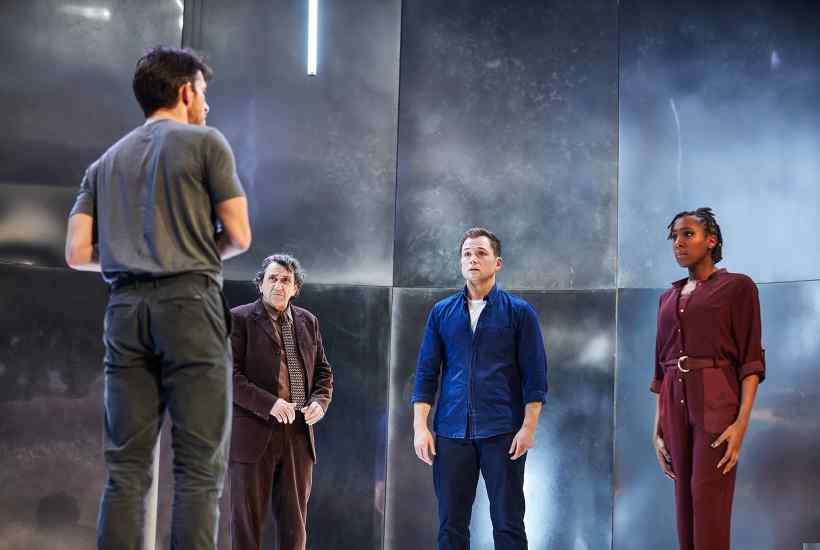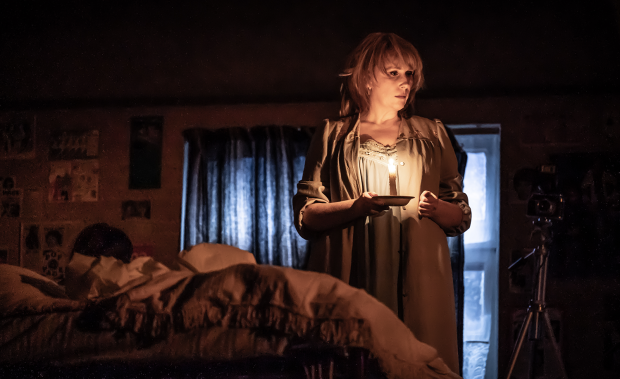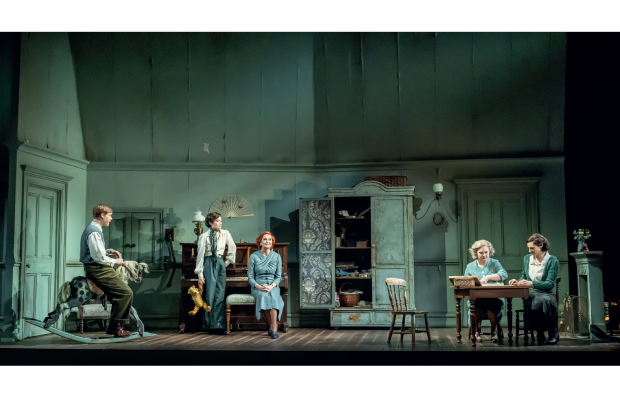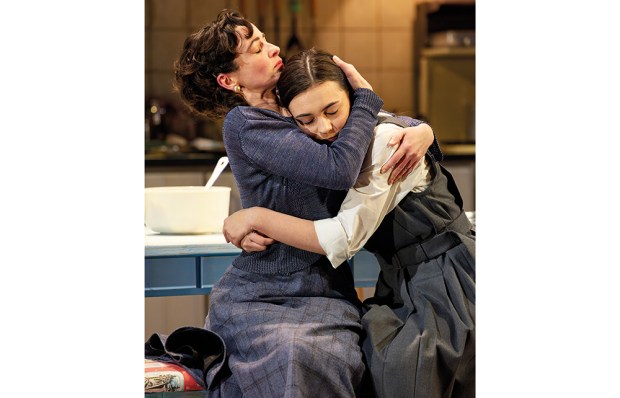Cock was written by Mike Bartlett in 2009 while he was in Mexico at a drama conference. The title suggests a cockpit where three characters compete for sexual dominance. W, meaning Woman, is a childminder attracted to a gay man, John, who is thick but handsome and deeply involved with M, or Man. W adores John even though he can’t stand women. ‘They’re like water when you really want beer,’ he says, charmlessly. When they have sex she politely asks him not to treat her genitals ‘like a Travelodge’.
After a brief fling, W decides she wants to marry John and raise a family with him in domestic bliss. But John isn’t so sure. He describes his girlfriend to others as ‘tall, manly and with big hands’. And John’s real problem is M, his long-term partner. Should John dump him or not? To help him decide, he invites W to dinner with M at the flat they share. M’s hatred of women is far more pronounced than John’s and he unleashes a barrage of tawdry putdowns even before W arrives. Does she look like Ray Winstone? he asks. Or perhaps she resembles the girl in The Exorcist with the swivelling head.
Then the bell rings, ‘Open the door before she breaks it down,’ says M. The dinner party is a long, vicious interrogation of W by the loathsome and misogynistic M. And there’s a cameo appearance by M’s dad who shows up to throw in a few sexist banalities of his own. The standard of invective is feeble and the characters have to scream their lines at top volume to give the words any impact. At least half an hour of the play consists of thesps shrieking relentlessly at each other and damaging their vocal cords. You’ll have a quieter night in an artillery range.
At the end of the dinner party, John chooses between M and W. Then he changes his mind several times. Which is true to his character. He’s a confused and self-absorbed halfwit. His girlfriend, W, is a delusional punchbag who convinces herself that marrying a gay bodybuilder will bring her fulfilment. And her nemesis, M, is a monstrous bully whose every utterance is a crude and manipulative insult. Spending two hours with these narcissistic windbags is sheer torture. Only a committed and lifelong woman-hater could possibly derive any pleasure from this show. The production wants to be seen as Serious Art so there’s no décor or furniture on stage. The action is set in a blank steel drum like the inside of a washing machine. At the end of each scene, the characters perform an artful dance in slow-motion to indicate their feelings for each other. My son, aged 15, enjoyed the show more than me. But he only gave it ‘two stars’. It’s years since I saw anything as nasty as this.
Red Pitch is about three teenage footballers, Bilal, Joey and Omz, who practise each week at a west London sports ground. Their community is changing. Old council blocks are falling. Yuppie towers are rising in their place. Joey is outraged when his favourite chicken takeaway becomes a Costa. ‘I asked for wings. They offered me soup.’ The lads play Sunday League football and they’re ready to bid for a professional contract at Queen’s Park Rangers.
Because this show is produced by the ultra-progressive Bush Theatre, it seemed inevitable that one of the lads would come out as gay, another would suffer police brutality and a third would be a victim of institutional racism. But the script doesn’t mention such problems. Nor does it touch on drugs, crime, racial violence or religious bigotry. Which is hugely refreshing. Joey advises his pals to consider a fallback career just in case their sporting ambitions falter. Omz will be a graphic designer, announces Joey. Bilal, who has a good head for maths, will enter investment banking. And Joey himself will study law. He assumes that these professions will be open to them and that nothing will affect their progress other than their aptitude and their hunger to succeed.
Black characters in modern plays rarely speak with such optimism. The results of the QPR trials arrive: one boy is offered professional terms and the others are rejected. This leads to jealousy, anger and an outbreak of violence that actually looks real. Most stage fights are choreographed by ‘movement artistes’ who have never witnessed a pub brawl or a prearranged fight in a playground. Here the actors get stuck in physically, and they’re not afraid to slam each other into the stage furniture with maximum force.
This is a terrific drama and it works for very simple reasons: the characters are likeable and their dramatic objectives are realistic and interesting. Mike Bartlett should pop in to see how it’s done.
Got something to add? Join the discussion and comment below.
Get 10 issues for just $10
Subscribe to The Spectator Australia today for the next 10 magazine issues, plus full online access, for just $10.
You might disagree with half of it, but you’ll enjoy reading all of it. Try your first month for free, then just $2 a week for the remainder of your first year.














Comments
Don't miss out
Join the conversation with other Spectator Australia readers. Subscribe to leave a comment.
SUBSCRIBEAlready a subscriber? Log in